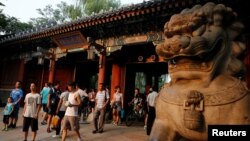China’s world-famous Peking University has moved to strengthen Communist Party control and limit dissent.
The move follows demonstrations across the country. Those protests were called to publicize issues such as labor rights and sexual abuse.
Peking University, often called "Beida" for short, has a long history of student activism.
On November 14, the school warned its students against taking part in demonstrations of support for labor-rights activism.
Recent labor-rights demonstrations involved some former Peking University students. The university said that students would be held responsible if they “challenged the law.”
Earlier, the Communist Party committee at Beida reportedly set up groups to carry out inspections as well as “control and management” of the school’s grounds. That information comes from a document released by the committee. The Reuters news agency saw a copy of the document.
The committee held a meeting for all its members on November 13. At the meeting, the committee said one recent Beida graduate who went missing after labor protests had been working with an illegal organization.
Reuters reported that a representative of Peking University said the school was not able to immediately comment on the meeting or warnings to students.
A history of activism
Peking University is set on a huge, tree-covered campus in northwestern Beijing. Its students helped to launch the anti-imperialist May Fourth Movement in 1919. They also were involved in the pro-democracy Tiananmen protests in 1989.
But student activism has been increasingly limited during the presidency of Xi Jinping.
Current and former students of universities have joined with labor activists at protests called to support factory workers fighting for the right to setup their own labor union. International news media have reported on the movement.
The Communist Party announced in October that Qiu Shuiping had been named as the new party secretary at Peking University. Observers say the appointment is a sign of greater restrictions on students. Qiu is a former head of Beijing’s state security office. He has little experience as a school administrator.
Activists disappear
Last weekend, at least 12 labor activists went missing in the cities of Beijing, Shanghai, Guangzhou and Wuhan. Most of them were college students or recent college graduates.
Five of the missing were recent graduates of Beida. One of them, Zhang Shengye, was taken by unidentified men and put into a car on the Beida campus. The university told Reuters that the incident was a lawful seizure by police of a suspect and did not involve students.
The incident led to action by a group of students who described themselves as a “concern group for missing Peking university graduates.” Last Sunday, the group gave out information about Zhang and others who had gone missing.
On Monday and Tuesday, warnings reportedly were given to students who had spoken out or supported the labor rights movement. One of those students said the warnings came from teachers, parents and what appeared to be policemen in plain clothing. The student spoke with Reuters, but did not want to be identified.
That person also said students were told Peking University officials formerly had protected them from punishment or other action. The student added that anyone who demonstrated in support of the missing students would no longer be protected.
No one explained what laws the student group had broken or why people had been seized on campus, the student added.
“Zhang Shengye was someone who was concerned about society, cared about the lower classes and was close to workers,” the student told Reuters. “Why would someone like that be treated like this?”
I’m Ashley Thompson.
Ashley Thompson adapted this VOA story for VOA Learning English. George Grow was the editor.
_________________________________________________________________
Words in This Story
dissent - n. public disagreement with an official opinion, decision, or set of beliefs
challenge - v. to question the action or authority of (someone)
management - n. the act or process of controlling and dealing with something
graduate - n. a person who has earned a degree or diploma from a school, college, or university
campus - n. the area and buildings around a university, college, school, etc.







